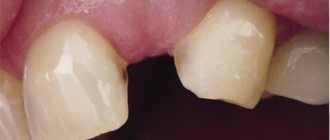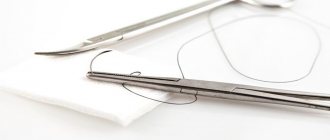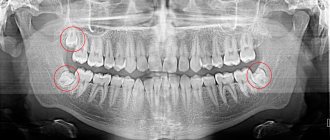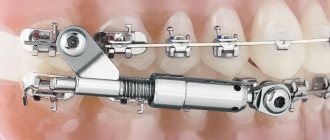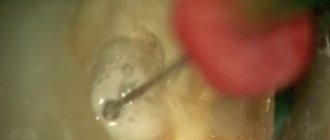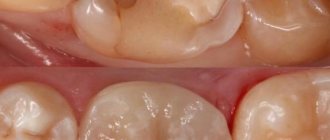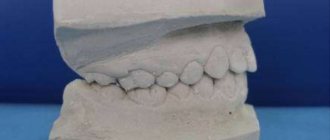5071
The final stage of correcting the bite and aligning the elements of the dentition is wearing retention devices.
It is not recommended to ignore the use of aligners, retainers or plates after removing braces, even when correcting minor defects, since the effect of a long main treatment period will be short-lived.
Most often, specially designed mouthguards are used to consolidate the results obtained, since the devices have many advantages compared to other devices.
Consolidate the result
You've removed your braces and are now sporting a Hollywood smile. But it won’t last long if you don’t consolidate the results. Our body is insidious, and at the slightest change it resists.
Teeth freed from braces strive to take their usual place, and in the absence of support and fixation, they will quickly take the position that you have been getting rid of for so long with the help of braces.
The purpose of retention devices is to hold the elements of the dentition in the direction specified by the braces.
Mouthguards are usually worn twice as long as braces. Often they get by with a similar period. The minimum period is one and a half years. In rare cases, a mouthguard may need to be worn for many years.
The retention period, that is, the time for consolidation of the result, depends mainly on three factors:
- Age. As a rule, treatment of malocclusion in children is faster, easier and more effective. The older the patient, the longer the main treatment period and recovery period.
- Type and complexity of pathology . The more pronounced the defects were, the more intense the resistance.
- Treatment time. After just a few months of treatment with braces, the maximum that we were able to achieve is visible. Braces are worn for two years, or even more. For what? So that the result does not disappear. The longer the treatment period, the more reliable it is.
General overview of devices
The device looks like a thin transparent “case” for the elements of the dentition, completely repeating their shape. The mouth guard fits tightly to each tooth and holds it in the position specified by braces.
Modern mouthguards are made from medical polymers. The material is completely safe and does not cause allergies. Most often, manufacturers use compositions based on polyurethane or silicone.
This is perhaps the most comfortable orthodontic device. The mouthguard does not pinch or cause pain, practically does not interfere with speaking, and is almost invisible. You can't just eat with her.
You get used to this lightweight and convenient device quite quickly. The adaptation period is up to two hours.
Carefully! The product is very fragile and can easily crack in the mouth. Do not store the device in random places not intended for this purpose; it may be accidentally crushed.
Individual devices tend to wear out, become softer, and become looser. Six months after purchase, it will no longer support teeth and lose effectiveness.
You don't know what to do when your teeth move apart after braces? Let's figure it out together.
Read here how long you should wear retainers after braces.
At this address https://orto-info.ru/sistemyi-vyiravnivaniya-zubov/kappyi-elayneryi/chto-takoe-invisalign.html the smallest details about Invisalign aligners.
Operating principle
The essence of wearing a retention mouthguard is to fix and maintain the teeth in the desired position. The device does not expand or straighten anything - the braces have already done that.
Thus, the teeth “learn to live independently,” and after all orthodontic treatments are removed, nothing will happen to them.
The device relieves tension in the jaw muscles, which prevents the preservation of the results of orthodontic treatment, and acts quite gently. In terms of strength and effectiveness, a mouthguard is somewhat inferior to a retainer.
The key to the effectiveness of mouth guards is regular wearing, according to the doctor’s recommendations. You should use the device for at least several hours every day. A break even for a day is undesirable.
Contact the professionals
Our dental clinic provides a full range of orthodontic services. We install universal and muscle relaxing Invisalign aligners, retainers and other types of structures. If you intend to buy mouth guards and correct crooked teeth, please contact us. The best service awaits you here:
- guarantee for procedures;
- 5% discount for new clients;
- free parking near the clinic.
Since aligners cannot be classified as inexpensive orthodontic systems, we give you the opportunity to use installment plans. Get treatment from Atri-Dent dentists and enjoy a beautiful smile!
The clinic is located near the Vykhino metro station in the South-East Administrative District.
Varieties
In orthodontics, there are three types of retention aligners, differing in manufacturing method, material and effectiveness.
Standard
The cheapest devices. Conveyor products are produced not according to a cast, but according to a single sample. They are rarely used as a retention agent, since they relieve tension in the jaw muscles rather than fixing the elements of the dentition in their original position.
During production, individual characteristics are not taken into account, so they may be uncomfortable to wear.
Advantages such as transparency, invisibility, and compactness do not apply to a standard mouth guard. It is thick and without any “dental” relief. Reminds me of a horseshoe. It is very difficult to talk to her.
Pros:
- low price;
- strength and durability.
Minuses:
- uncomfortable;
- can only be worn at night;
- do not take into account the details of fragments of the dentition;
Most often, products are not used for retention therapy, unless the patient has ideal “standard” jaw bone shapes and minor occlusal defects have been corrected.
Thermoplastic
The models are made of a material that becomes pliable at high temperatures and hardens when cooled. Such products are also not made from casts, but are more convenient and individual.
How are they installed? First they put it in hot water and then put it on the patient’s teeth. The workpiece is cooled and finally takes the shape of all the elements (of course, without details).
Pros:
- low price;
- suitable for both primary treatment and retention;
- take into account the individual characteristics of the jaws;
- strength.
Minuses:
- not aesthetic;
- interfere with talking;
- the details are poorly worked out: in general, the jaw will remain straight, but individual teeth may move slightly.
Individual
Best suited for retention therapy. They are made strictly according to the patient's impression. The models are thin, compact, and do not cause any discomfort. During manufacturing, the smallest details of the dentition are taken into account. The products are transparent and almost invisible.
Pros:
- high efficiency;
- comfort;
- can be worn even around the clock;
- put on and take off without effort, and the mouthguard does not fall out on its own;
- doesn't interfere with talking.
Minuses:
- Fragility. It must be stored very carefully. Even light pressure can cause the mouthguard to crack.
- Softness. A thin polymer aligner cannot be compared with massive metal braces.
- Fragility. The individual device wears out quite quickly; it will have to be changed every few months.
Even with careful storage and wearing, the device loses strength over time, becomes loose and wears out.
Watch the video to see how custom retention aligners are made.
Advantages and disadvantages
We have just talked about most of them. Now let's summarize.
Pros:
- Relatively low price. After expensive braces, this is doubly pleasant.
- Safety. There have never been cases where wearing a mouthguard caused any unpleasant consequences. Theoretically, there is a possibility of allergies, but in practice this has not been observed.
- Compact and convenient. The mouthguard does not cause discomfort (of course, if you don’t leave it for a few days) and does not interfere with talking.
- Aesthetics and transparency . Most likely, no one will notice it except you.
Minuses:
- Fragility. The device is easy to deform.
- Softness . The device does not hold the elements of the dentition one hundred percent.
- Fragility. Most likely, you will change more than one aligner during treatment.
- The need for regular wearing and discipline.
- Some people need to wear a mouthguard for many years.
The nuances of using trays after braces
The production of mouthguards fixed after removal of brace systems is carried out on an individual basis, but in some situations it is possible to produce traditional models. As a rule, the above orthodontic devices are made from high-molecular natural compounds - biopolymers, which are fully compatible with the human body. At the same time, they do not damage the oral mucosa, do not interfere with the process of chewing food and are not capable of causing discomfort. There is also no need to have special skills to install such mouth guards.
However, the use of such devices after braces is not without some negative aspects. These include:
- Can cause increased salivation;
- May disrupt the functioning of the speech apparatus;
- Requires frequent visits to the orthodontist.
Wearing rules
They are prescribed by a doctor. Some wear the device constantly, others wear it for several hours a day. The “standard” recommendation is 10 hours.
It is better to associate wearing the device not with sleep, but with a certain period of the day. Who cares? - you ask. Big. Tested in practice. If you are told to wear a retention device ten hours a day, but you only wear it for five, then don’t complain about its low efficiency.
Wearing time may be reduced. For example, for the first year and a half you wear a mouthguard for ten hours, and then for six. This is again individual and determined by the doctor.
When to remove the mouth guard? If you are prescribed to wear a device full-time, you should only remove it to eat and brush your teeth.
The main thing is regularity. If you stop wearing the device ahead of time, a relapse will immediately begin. If you leave the device for at least a week and then try to put it on again, it will be difficult and painful.
Important! Your teeth will never be as beautiful as they were a couple of days ago. Remember how much effort, time and money you spent on braces.
You can’t eat with a mouthguard, not because it’s harmful, you just won’t be able to do it. The main thing is to remember to put it on again after eating!
Increased hygiene is required while wearing a mouthguard. Even if you have never had tooth decay in your life, it may appear after your braces are removed. Have it professionally inspected and cleaned regularly, and promptly remove any dark spots that appear.
When is the use of dental trainers and the price of the products justified?
In this article we will tell you how much aligners for teeth straightening cost for the entire treatment period.
Here https://orto-info.ru/ortodonticheskoe-lechenie/retentsionnyiy-period/tsena.html we’ll talk about the cost of installing permanent retainers.
Types of retention devices
- The most widely used orthodontic splints are in the form of a metal arch attached to the inside of the teeth - this is a non-removable type
of retainer. The patient gets used to them faster, and they are invisible.
- removable type
includes transparent aligners. They are quite clearly visible to others and lead to minor disturbances in diction while wearing. But they do not impose restrictions on the diet and are easier to care for.
- The tertem type includes retainers of the combined type.
Combined retainers are installed in cases where different pressure forces are required on the upper and lower jaws.
Care instructions
In order for the device to last a long time and the retention period not to be prolonged, it is recommended to adhere to some rules:
- Clean your device every day .
This can be done with a regular paste or a special solution. If you have a custom mouth guard with a complex texture, it will be difficult to wash it in hard-to-reach places. It is better to do this not with a regular brush, but with a special orthodontic one. It is smaller and its bristles are longer. You can purchase it at a specialty store or pharmacy. - Store in a special container. Typically, a U-shaped plastic case is provided with the mouthguard.
Develop the habit of always putting the device back in its place. The mouthguard is soft and thin, so it can easily become deformed, so it is not recommended to store it without a case. - Maintain integrity. Your jaw puts a huge strain on the device, not to mention improper storage.
Holes and cracks may appear on their own. If you notice that the polymer device is broken, cracked or worn out, buy a new mouthguard. A broken device becomes ineffective.
Types of treatment procedures
In our clinic we provide the following orthodontic services:
- production/fitting of retention mouth guards (for children and adults);
- treatment with Invisalign-Full dental structures;
- treatment with Invisalign-Express dental structures;
- treatment with a Biostar mouth guard with a moving function.
Check out the price list for the cost of procedures. We also provide pricing advice over the phone. The final cost of treatment will be determined after the examination, when together with you we will choose the appropriate method for correcting your teeth or bite.
Prices
The table shows the average cost of various types of products per jaw.
| Product type | Cost in rubles | |
| Standard | 700—800 | |
| Thermoplastic | 200—300 | |
| Individual | silicone | 3 000 |
| polyurethane | 7 000—8 000 | |
At a lower price, standard and thermoplastic mouthguards can be ordered online, but in this case there is a risk that the model will not suit you, or there will be problems with delivery.
